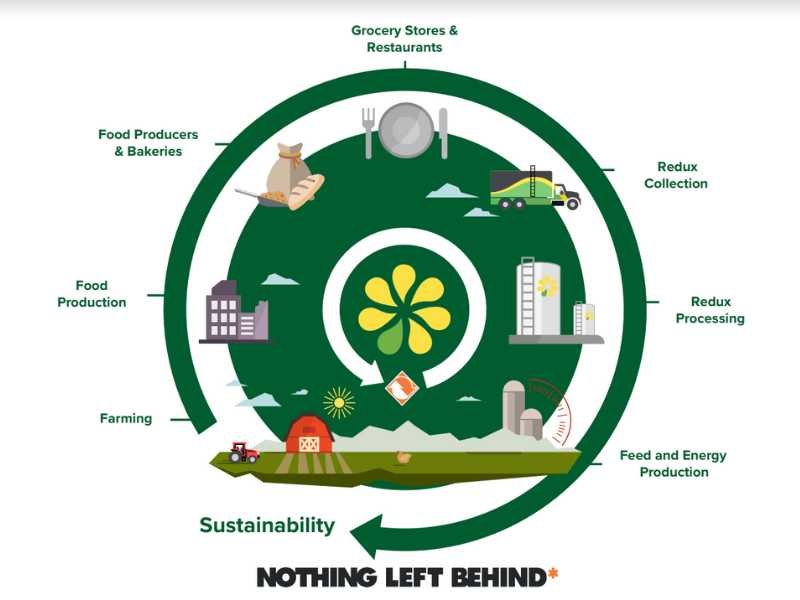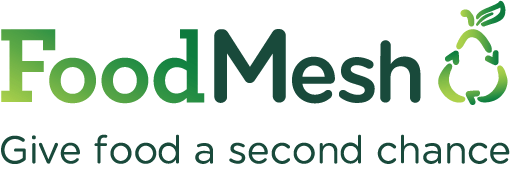
05 Sep Spotlight on: Redux
In support of the Fraser Valley Regional District Food Recovery Network, this spotlight shines a light on local businesses that are finding innovative ways to upcycle surplus food in the Fraser Valley – turning food that would have previously been discarded into a whole new product, and creating new value in the process.
What is Redux’s mission?
At Redux, we are devoted recyclers, empowering communities to convert traditional waste into valuable products that contribute to a sustainable world for generations to come. Guided by our core values, we continuously deliver frictionless solutions for our customers and partners with the goal of making a significant impact on the environment and fostering a better future for all. Our tagline, Nothing Left Behind*, symbolizes this commitment to providing environmental and sustainable solutions.
What is your process for upcycling surplus food?
Our process involves two different methods, depending on whether it is a meat or seafood by-product or non-meat surplus food.
For meat or seafood by-product, we employ rendering. This method converts unused animal parts, such as bones and fat, into valuable ingredients for products like renewable energy and animal feed. By doing so, we minimize waste and maximize resource utilization, contributing to a more sustainable and environmentally friendly approach to food production.
For non-meat surplus food, as a priority process, we have the Redux Meal production. This method involves converting excess grains, fruits, and vegetables into a nutritious and sustainable feed ingredient suitable for livestock and poultry. By upcycling these non-meat food items, we actively reduce food waste and continue our commitment to an efficient and eco-conscious food production system.
Where are you sourcing the ingredients you are upcycling?
We source the ingredients we upcycle from customers across western Canada, who have pre-consumer food waste. Our service area covers over 1.2 million square kilometers, and each year, we handle over 1 billion pounds of waste, diverting it from landfills. This significant effort enables us to collect a wide range of surplus food items, which we then process through our rendering and Redux Meal production methods to minimize waste and promote sustainable food production practices. By efficiently processing this surplus food, we continue to contribute to a more environmentally friendly and responsible approach to food production in western Canada.
Who are the consumers of your products?
Our upcycled products are exported globally and are used in renewable energy production such as renewable diesel and renewable natural gas and agricultural and pet food industries.
What inspired the founding of Redux?
The founders, Jack and Gordon Diamond, established West Coast Reduction Ltd., the parent company of the Redux program. Their inspiration was driven by a strong commitment to address food waste and promote sustainability in the food industry. By transforming surplus food into valuable resources, they aimed to reduce waste, divert from landfills, and contribute to a more sustainable and responsible approach to resource utilization.
What are some of the benefits of your products?
The benefits of our products are multi-faceted:
- Environmental Impact: By upcycling surplus food, we significantly reduce food waste, diverting it from landfills. This helps lower greenhouse gas emissions, minimize environmental pollution, and conserve natural resources.
- Sustainable Resource Utilization: Our upcycled products serve as valuable resources for the agricultural and pet food industries. They provide a renewable and sustainable alternative to traditional feed ingredients, reducing the demand for new raw materials.
- Green Energy Contribution: In addition to agriculture and pet food, our products play a role in green energy production, contributing to a cleaner and more sustainable energy landscape.
- Cost-Effectiveness: Our products offer cost-effective solutions for businesses in the agricultural and pet food sectors. By utilizing upcycled ingredients, they can lower their production costs without compromising on quality.
- Circular Economy: We actively contribute to the circular economy by closing the loop on food waste. Instead of discarding surplus food, we transform it into valuable products, creating a more efficient and sustainable food system.
- Supporting Local Farmers: Our upcycled products support local farmers by providing a consistent and nutritious source of animal feed. This helps enhance food security and strengthens the agricultural community.
- Promoting Responsible Consumption: By offering upcycled products, we encourage responsible consumption and sustainable practices, fostering awareness and positive environmental stewardship.
Overall, our upcycling efforts bring numerous environmental, economic, and social benefits, making a positive impact on the food industry and the planet.
How much food have you rescued to date?
Annually, we save 1 billion pounds of meat and seafood by-products not fit for human consumption and other non-mean pre-consumer food waste from landfills. Over the last 50+ years, we have saved tens of billions of pounds from going to waste.

What can you share about the environmental, social and/or economic impact of your work to date?
Our work has significant environmental, social, and economic impact. Each year, we divert over 1 billion pounds of surplus food by-products from landfills, preventing the release of methane, a potent greenhouse gas with a much higher global warming potential than carbon dioxide. By upcycling these organic materials like meat, we contribute to greenhouse gas emissions reduction, supporting a more sustainable and responsible food production system. Through this process, we help mitigate the environmental impact of rotting meat in landfills and promote a more eco-friendly approach to resource utilization.
What has your experience working with rescued food been like?
Dealing with rescued food has been highly rewarding, leading to a significant reduction in food waste and inspiring innovative approaches to resource utilization. Collaborations with stakeholders have strengthened sustainable supply chains, while positive customer feedback underscores the quality and environmental benefits of our upcycled products. Through education and continuous improvement, we remain committed to making a positive impact on the environment and promoting responsible consumption.
What do you think makes Redux unique?
What makes Redux unique is our comprehensive approach to upcycling, addressing both meat and non-meat surplus food items. We go beyond just providing products; we are a one-stop-shop service solution for our customers – delivering frictionless solutions that make them an integral part of the solution for a more environmentally friendly world. Our commitment to environmental sustainability, extensive experience, and diverse partnerships set us apart in promoting responsible resource utilization and reducing food waste, all contributing to a greener and more sustainable future.
What would you consider Redux’s biggest success to date?
Redux’s biggest success to date is not only the upcycling of over 1 billion pounds of surplus food by-products annually but also the ability to deliver such an essential service to the communities we serve as a self-sustaining business. Our model doesn’t rely on any special federal or provincial government funding programs, or any other community tax money to operate – ensuring that our solutions remain viable and continue to benefit the environment and society in the long term. This achievement showcases our dedication to providing a self-sustaining and continuous solution, contributing to a greener and more responsible future without relying on external financial support.
What are some of the biggest challenges Redux has faced?
Some of the biggest challenges we face include:
- Supply Chain Management: The fast-changing market landscape impacts securing a consistent supply of surplus food, necessitating strong partnerships with suppliers.
- Public Awareness and Perception: Educating the public about upcycled products and building trust remains essential amidst evolving consumer attitudes.
- Regulatory Environment: Adhering to food safety and environmental regulations demands ongoing vigilance in a dynamic regulatory landscape.
- Scaling Operations: Meeting increasing demand while ensuring product quality requires efficient and strategic expansion.
- Market Dynamics: Penetrating new markets requires adaptability to local dynamics and consumer preferences.
- Competitor Landscape: Competitors receiving government funding may distort pricing, impacting market competitiveness.
Despite these challenges, Redux remains committed to overcoming obstacles and contributing to a more sustainable and responsible food production system.
Where can someone looking to buy your product find them?
If someone is interested in buying our product, they can find the full list on our parent company’s website. Our account team supports customers worldwide, offering our upcycled products at livestock and poultry farms, pet food manufacturers, agricultural retailers, and feed suppliers. Our tallow product is exported to manufacturers of dish detergents, soap, candles, and cosmetics. We also collaborate with local partners and resellers, ensuring accessibility through various channels.
What has been the public response to your products?
The public response to our products has been overwhelmingly positive. Customers not only appreciate the sustainability and environmental benefits of our offerings but also actively integrate the data we provide into their Environmental, Social, and Governance (ESG) programs. By partnering with Redux and allowing us to service their pre-consumer food waste by-products not fit for human consumption, or by using our upcycled ingredients, they actively participate in the positive impact we create, aligning with their sustainability goals. This collaborative approach strengthens our commitment to promoting responsible and sustainable food production and contributing to a greener and more eco-conscious future.
Have you noticed a change in attitude towards upcycled food since Redux first started?
Since Redux’s inception, attitudes towards upcycled food have noticeably shifted. It used to be called the “silent industry”, but now more brands and companies we work with proudly share their participation in our program, and their commitment to being environmentally responsible by using our sustainable solutions. Initially met with skepticism, upcycled food is now embraced by more people and businesses. Growing awareness of food waste and sustainability has driven this change, as consumers seek eco-friendly alternatives. Businesses, including agricultural and pet food industries, increasingly incorporate upcycled ingredients to enhance their sustainability efforts and meet ESG goals. Public awareness campaigns and advocacy have played a significant role in promoting responsible consumption and driving the acceptance and adoption of upcycled products.
What advice would you share with someone looking to start their own food upcycling venture?
To ensure success in a food upcycling venture, the following is required:
- Research opportunities and assess market demand.
- Understand and ensure compliance with food safety and environmental regulations.
- Focus on building infrastructure with quality, innovation, and sustainability to adapt to the fast-changing market.
- Educate and raise awareness about upcycled food.
- Develop a strong brand and marketing strategy.
- Optimize operations for efficiency and scalability.
- Monitor and measure environmental impact.
- Embrace continuous improvement and innovation.
- Establish the necessary infrastructure to support your venture effectively.
Having a good grasp on the ever-changing market, the significant environmental impact of recycling, and sufficient funding enables you to execute these crucial steps and create a successful and impactful food upcycling venture.
Join the Fraser Valley Regional District Food Recovery Network
Be part of a growing community of organizations that are coming together to help ensure that no food unnecessarily goes to waste.
Prepared by Megan Czerpak, Head of Communications at FoodMesh


